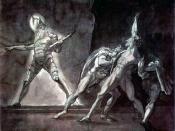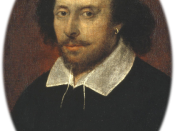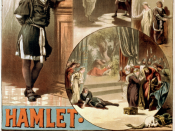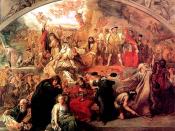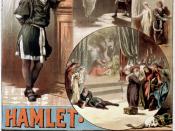The Imbalance of the Idealistic Mind and Human Nature Saira Husain It is often said, "Nobody is perfect". This phrase is used as a rationalization of foolish human mistakes that could have been prevented. However, this statement has a much more profound significance. It contains an important lesson that guides or rather should guide people through life. By admitting that nobody is perfect, the individual demonstrates a deeper understanding of the human nature and inner self. This knowledge is essential to the individual's creation of healthy relationships with one's surrounding. In William Shakespeare's play, Hamlet, the gap between perfection or ideal and the reality or imperfection becomes monumental and the Throughout the play, Hamlet talks eloquently about the world and humanity and then finds himself and others close to him, falling short of these ideals. Hamlet dislikes his uncle who compares poorly with Hamlet's father and has behaved villainously by killing his own brother for his kingdom and queen.
Hamlet is already distraught over losing his father but on top of that he has to deal with the marriage of his beloved mother to his uncle, who he perceives as being cruel and cold-hearted. "A little more than kin, and less than kind." (I; ii; 65) This is Hamlet's first line in the play, which clearly demonstrates the extreme hatred Hamlet has towards his uncle. Claudius misleads Hamlet when he shipped him off to England under the guise of a restful retreat and when he realizes that the new king has lied to not only him, but also the people of Denmark about the death of the former king.
Hamlet also feels intense betrayal from his mother. He trusted her and feels like she has disregarded any love she ever felt towards her former husband. " Mother, you have my father much offended." (III; IV; 11) " A bloody deed-almost as bad, good mother, As kill a king, and marry with his brother. (III; IV; 29-30). Hamlet is revolted by the idea of his uncle and his mother married. He is simultaneously angry with his mother, jealous of her attention to Claudius, and desperately wishing for her love. He berates her with sharp edged comments, "you are the queen, your brother's wife and -would it were not so- you are my mother"(III.iv.18-19); but he loves her just the same. His love for her is first expressed without words when he stays in Denmark instead of returning to college simply because she asks him to.
